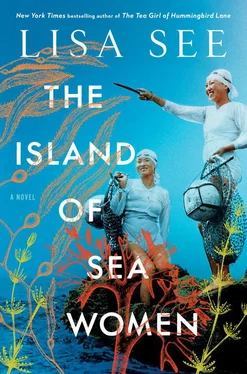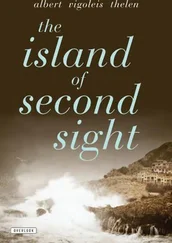Lisa See
THE ISLAND OF SEA WOMEN
Although parts of the story take place when the McCune-Reischauer system of romanization was standard, I have used Revised Romanization of Korean, which was formalized in 2000. All personal names are rendered in common spelling. Wherever possible, I have used Jeju words. On the mainland, halmeoni means “grandmother.” On Jeju, in a fitting example of the respect in which women are held for their strength, independence, and persistence, halmang means both “grandmother” and “goddess.” According to tradition, the title of halmang should follow the name, but to avoid confusion I have put it first: Seolmundae Halmang becomes Halmang Seolmundae or Grandmother Seolmundae.
Day 1: 2008

An old woman sits on the beach, a cushion strapped to her bottom, sorting algae that’s washed ashore. She’s used to spending time in the water, but even on land she’s vigilant to the environment around her. Jeju is her home, an island known for Three Abundances: wind, stones, and women. Today the most capricious of these—the wind—is but a gentle breeze. Not a single cloud smudges the sky. The sun warms her head, neck, and back through her bonnet and other clothing. So soothing. Her house perches on the rocky shoreline overlooking the sea. It doesn’t look like much—just two small structures made from native stone, but the location… Her children and grandchildren have suggested she allow them to convert the buildings into a restaurant and bar. “Oh, Granny, you’ll be rich. You’ll never have to work again.” One of her neighbors did as the younger generation asked. Now that woman’s home is a guesthouse and an Italian restaurant. On Young-sook’s beach. In her village. She will never let that happen to her house. “There isn’t enough money in all the pockets in all Korea to make me leave,” Young-sook has said many times. How could she? Her house is the nest where she hides the joy, laughter, sorrows, and regrets of her life.
She is not alone in her work on the beach. Other women around her age—in their eighties and nineties—also pick through the algae that has come to rest on the sand, putting what’s salable in small bags and leaving the rest. Up on the walkway that separates this cove from the road, young couples—honeymooners, probably—walk hand in hand, heads together, sometimes even kissing, in front of everyone, in broad daylight. She sees a tourist family, clearly from the mainland. The children and husband are so obvious in their matching polka-dot T-shirts and lime-green shorts. The wife wears the same polka-dot T-shirt, but otherwise every bit of her skin is protected from the sun by long pants, sleeve guards, gloves, hat, and a cloth mask. Children from the village climb over the rocks that spill across the sand and into the sea. Soon they’re playing in the shallow depths, giggling, and challenging each other to be the first to reach the deepest rock, locate a piece of sea glass, or find a sea urchin, if they’re lucky enough to spot one. She smiles to herself. How differently life will unfurl for these young ones…
She also observes other people—some not even trying to hide their curiosity—who stare at her before shifting their gazes to some of the other old women on the shore today. Which granny looks the nicest? The most accessible? What those people don’t understand is that Young-sook and her friends are appraising them too. Are they scholars, journalists, or documentarians? Will they pay? Will they be knowledgeable about the haenyeo—sea women? They’ll want to take her photo. They’ll shove a microphone in her face and ask the same predictable questions: “Do you consider yourself a granny of the sea? Or do you think of yourself more like a mermaid?” “The government labels the haenyeo a cultural heritage treasure—something dying out that must be preserved, if only in memory. How does it feel to be the last of the last?” If they’re academics, they’ll want to talk about Jeju’s matrifocal culture, explaining, “It’s not a matriarchy. Rather, it’s a society focused on women.” Then they’ll begin to probe: “Were you really in charge in your household? Did you give your husband an allowance?” Often she’ll get a young woman who’ll ask the question Young-sook’s heard discussed her entire life. “Is it better to be a man or a woman?” No matter what the inquiry, she always answers the same way: “I was the best haenyeo!” She prefers to leave it at that. When a visitor persists, Young-sook will say gruffly, “If you want to know about me, go to the Haenyeo Museum. You can see my photo. You can watch the video about me!” If they still won’t go… Well, then, she becomes even more direct. “Leave me alone! I have work to do!”
Her response usually depends on how her body feels. Today, the sun is bright, the water glistens, and she perceives in her bones—even though she’s only sitting on the shore—the weightlessness of the sea, the surge that massages the aches in her muscles, the enveloping chill that cools the heat in her joints, so she allows herself to be photographed, even pushing back the brim of her bonnet so one young man can “see your face better.” She watches as he edges toward the inevitable awkward subject, until he finally arrives at his query: “Did your family suffer during the April Third Incident?”
Aigo, of course she suffered. Of course. Of course. Of course. “Everyone on Jeju Island suffered,” she answers. But that is all she will say about it. Ever. Better to tell him this is the happiest time of her life. And it is. She still works, but she’s not too busy to visit friends and travel. Now she can look at her great-granddaughters and think, That’s a pretty one That’s the smartest one yet. Or That one better marry well. Her grandchildren and great-grandchildren give her the greatest joy. Why couldn’t she have thought like that when she was younger? But she couldn’t have imagined how her life would turn out back then. She couldn’t have imagined today even in a dream.
The young man wanders off. He tries to talk to another woman, Kang Gu-ja, who’s working about ten meters to Young-sook’s left. Gu-ja, always crotchety, won’t even look up. He presses on to Gu-ja’s younger sister, Gu-sun, who yells at him. “Go away!” Young-sook snorts appreciatively.
When her small bag is full, she shakily gets to her feet and shuffles to the collection of larger bags she’s been filling. Once the small bag is emptied, she hobbles to an area of the beach untouched by the others. She settles back down, positioning her cushion beneath her. Her hands, though gnarled from work and deeply creased from years of exposure to the sun, are agile. The sound of the sea… The caress of warm air… The knowledge that she is protected by the thousands of goddesses who live on this island… Even Gu-sun’s colorful epithets can’t sour her mood.
Then in Young-sook’s peripheral vision she glimpses another family group. They aren’t dressed alike, and they don’t look alike. The husband is white, the wife is Korean, and the children—a small boy and a teenage girl—are mixed. Young-sook can’t help it, but seeing those half-and-half children makes her uncomfortable: the boy in shorts, a superhero T-shirt, and clunky tennis shoes, the girl in shorts that scarcely cover what they’re supposed to cover, earbuds plugged into her ears, and wires trailing down over her barely-there breasts. Young-sook guesses they’re Americans, and she watches warily as they approach.
Читать дальше














